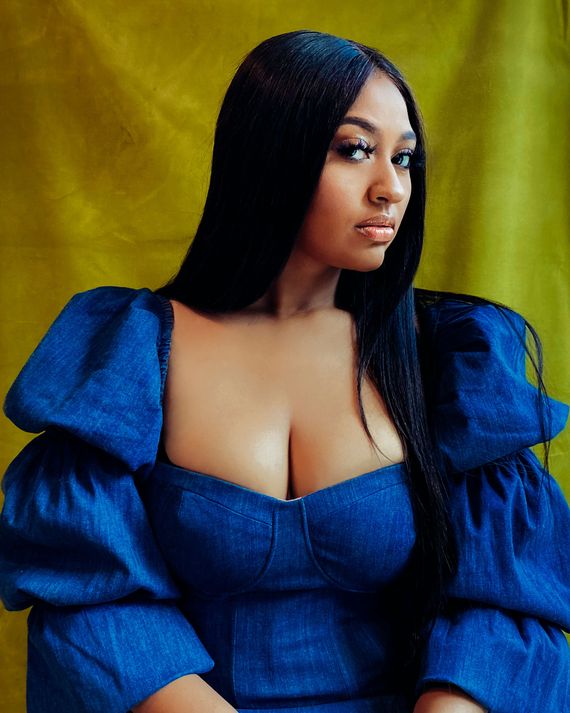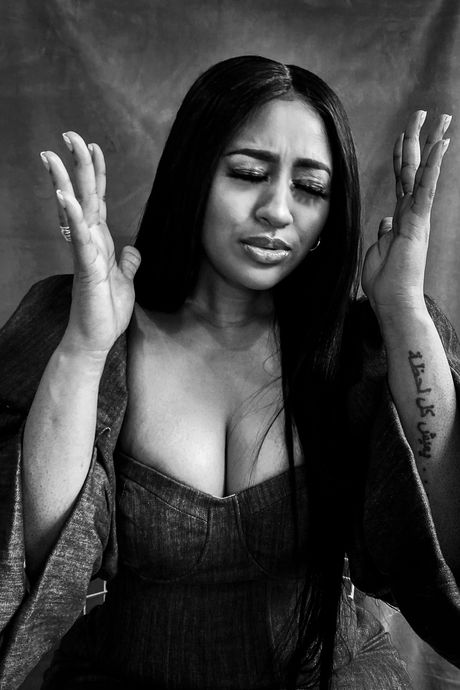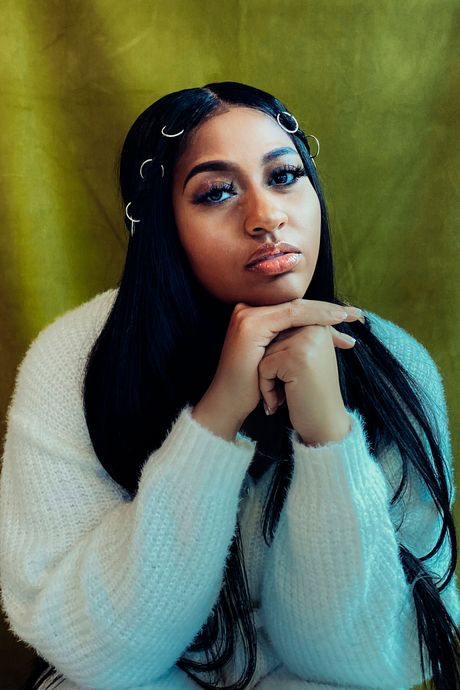
The guitar sounded a bit out of tune, but she liked it. Jazmine Sullivan was flipping through tracks on her computer, finding material to put words to for her new album. “It was so heart-wrenching,” she remembers. “It just hit me.” She jotted down lyrics for a plea: “Just don’t have too much fun without me / Don’t have too much, don’t have too much fun / Please don’t forget about me / Try not to love no one.” Her request is selfish, but it feels real. It became the first single, “Lost One,” from her new album, Heaux Tales. “I just tried to think of the saddest thing I could think of,” she says. “The thing that came to mind was losing somebody you loved.”
Among today’s crop of R&B artists, Sullivan is a voice — a singer in the tradition of Mary J. Blige and Alicia Keys. She’s also a writer. Heartache, heartbreak, that liminal space between desperately missing an ex and wanting them dead, burned, and buried — this is what she makes music about. Across three albums, the 33-year-old singer-songwriter has thrown her head back to cry out in song, sometimes wishing for love, sometimes recovering from it. Her songs often have two modes: rootless uncertainty and a boundless enthusiasm for the new — man, relationship, vision of life. Sullivan makes fans wait for it, averaging a longer hiatus between albums than most: There were two years between her first one, Fearless, and her second, Love Me Back, but five between Love Me Back and 2015’s Reality Show. All three have earned Grammy nominations.
“Can I keep my camera off?” she asks when I call her up on a December morning. She’s still wearing a robe and getting ready for a COVID-safe rehearsal downstairs. Sullivan has been busy since fans last heard her on Reality Show. She dropped singles — the very good Bryson Tiller collab “Insecure” for the HBO show of the same name — and lent her voice to Frank Ocean for Endless’s background vocals. (“I can’t explain it,” she says of working with Ocean, “except that it’s a beautiful mess.” She cackles.) She’s watched her mother battle breast cancer. And she’s been writing Heaux Tales, her first concept album. Sullivan is chatty but precise, especially when she talks about how methodically she approached the new work. The idea came from her label a few years ago, when she wasn’t sure what she wanted her fourth project to sound like. Sullivan was intrigued: “I’m like a Disney kid. When I was growing up, my mom was a playwright. When I write, I see it almost in pictures, like a full production. I went home and brainstormed, and Heaux Tales came up.” She envisioned an album of intimate confessions, the kind you spill out after a glass — or bottle — of wine. “I thought about the conversations I have with my girlfriends, my mom, different people like that.” The album would feature six “tales” — monologues from real women in Sullivan’s life — in which the protagonists speak plainly about their insecurities, longings, misshapen desires, romantic missteps.
The stories were like reporting projects, allowing Sullivan to step out of her own romantic experience and into a half-dozen others’. She wanted to hear things the women in her life feel deeply but wouldn’t necessarily say. One of the tales comes from fellow R&B singer Ari Lennox: This time last year, the singer went viral for a series of random, delightful rambling Instagram Lives. In the best one, Lennox describes, well, being dickmatized — the state of good sex making you act out of your mind. “I was damn near willing to just let him talk to me crazy because that shit was out of this world. Like, ‘Yes, Daddy. Yes. Okay,’ ” Lennox deadpans. “That dick spoke life into me — invigoration, blessings, soul. Turmoil,” Lennox concludes. “But heaven.” When Sullivan heard it, she couldn’t help but laugh. Another is “Amanda’s Tale,” narrated by her friend Amanda Henderson. “She was just talking about feeling inadequate and insecure, especially when it comes to Instagram — trying to find a way to compete in a world that glamorizes women being perfect or looking a certain way, and realizing you don’t.” The night before her label released a clip of Henderson’s tale on Instagram, Sullivan was so nervous she couldn’t sleep. “I was up like, Pleeeease don’t let anybody say anything bad to my friends,” she recalls. “ ’Cause I don’t want to cuss them out, but I will.”
One recording is pulled from a conversation among black women. “My mother got together a group of older women — she had them come over for pizza and wings and drinks. They got together and started talking,” Sullivan says. The resulting interlude, “Donna’s Tale,” is about how women, single or married, can use sex as a means to the same end: “You’re fucking your husband so you can get what the fuck you want,” one woman says, while others clap in agreement.


The tales are the protein. When Sullivan talks about the music on the album, it’s almost as an afterthought. She’d had ideas for songs and half-finished lyrics, but her desire to listen to her friends talk dictated the course of the project. For how capable a singer she is — “warm, well–textured, and big,” as this publication said in 2010 — she has a keen pen. “Bodies,” the excellent opener, sounds like the disorganized thoughts of a too-bright morning after, the hours when, half-conscious, you wonder: What did I do last night, which guy did I leave with? Am I about to leave here via a cab or an Uber? The questions spill out of Sullivan’s mouth, her vocals looped over and around one another. “I wanted to write it as if I’m actively in the moment, thinking, Oh my God. I’m so ashamed. But also, This is normal for me. Like, I do this all the time.”
In 2011, between Love Me Back and Reality Show, Sullivan tweeted, then deleted, that she planned to quit the music industry. I ask her to reflect on the 24-year-old version of herself that wrote those tweets, and later returned to make some of the best music of her career. She was in an abusive relationship at the time, she says, and extremely lonely. It made her growing success feel like an afterthought. Some of Heaux Tales, she adds, might have been what she needed at that time. “I never could have imagined I would end up in an abusive relationship, allowing that while I’m literally doing huge shows and blowing up in my own right,” she remembers. “I never want to be that girl again, and I don’t want anybody to experience that.”
Heaux Tales was harder to make than the albums that preceded it. Sullivan’s not quite sure why. “I’m not gonna lie. I had a hard time even singing,” she says. “Creatively, things didn’t come as natural this time. It’s natural that artists will have droughts sometimes as writers, but I don’t know. I just know it was not as easy this time.” She’s also butting up against some fans’ expectations. “I read something earlier today where [a commenter] was adamant, like, ‘I’m not getting this project! I don’t know who this woman is,’ ” she says. “And I was just like, Okay, it’s not for her. That’s cool. But some other people will be able to relate to it. Everybody won’t get it.” Many R&B listeners aren’t likely to be disappointed. The album fuses the messy and the tender and the insecure the way SZA did on Ctrl four years ago and Lauryn Hill did on Miseducation. Sullivan’s voice is bigger and broader than both of theirs, capably teasing out whines with bravado. Heaux Tales is already a New York Times critic’s pick and topped NPR’s list of most anticipated 2021 albums.
I wonder aloud if this album was trickier because she’s in love now. Her early music, including and especially her breakout single, “Bust Your Windows,” made heartache her signature. Is it harder to write to that expectation when you’re happy? Sullivan’s boyfriend is a musician-writer-producer. The day we talk, he woke up early to shovel the snow in front of her house so her band could come over. “We moved fast,” she says of the relationship. “But we were probably just on the same page. We don’t mind talking things out. We know we don’t know everything, and that’s where a good relationship starts. You’re open to learning.” But make no mistake. “If I choose,” she adds, laughing, “I can write about heartaches because I could just pull from the many heartaches I’ve had in my life.”
*A version of this article appears in the January 18, 2021, issue of New York Magazine. Subscribe Now!





